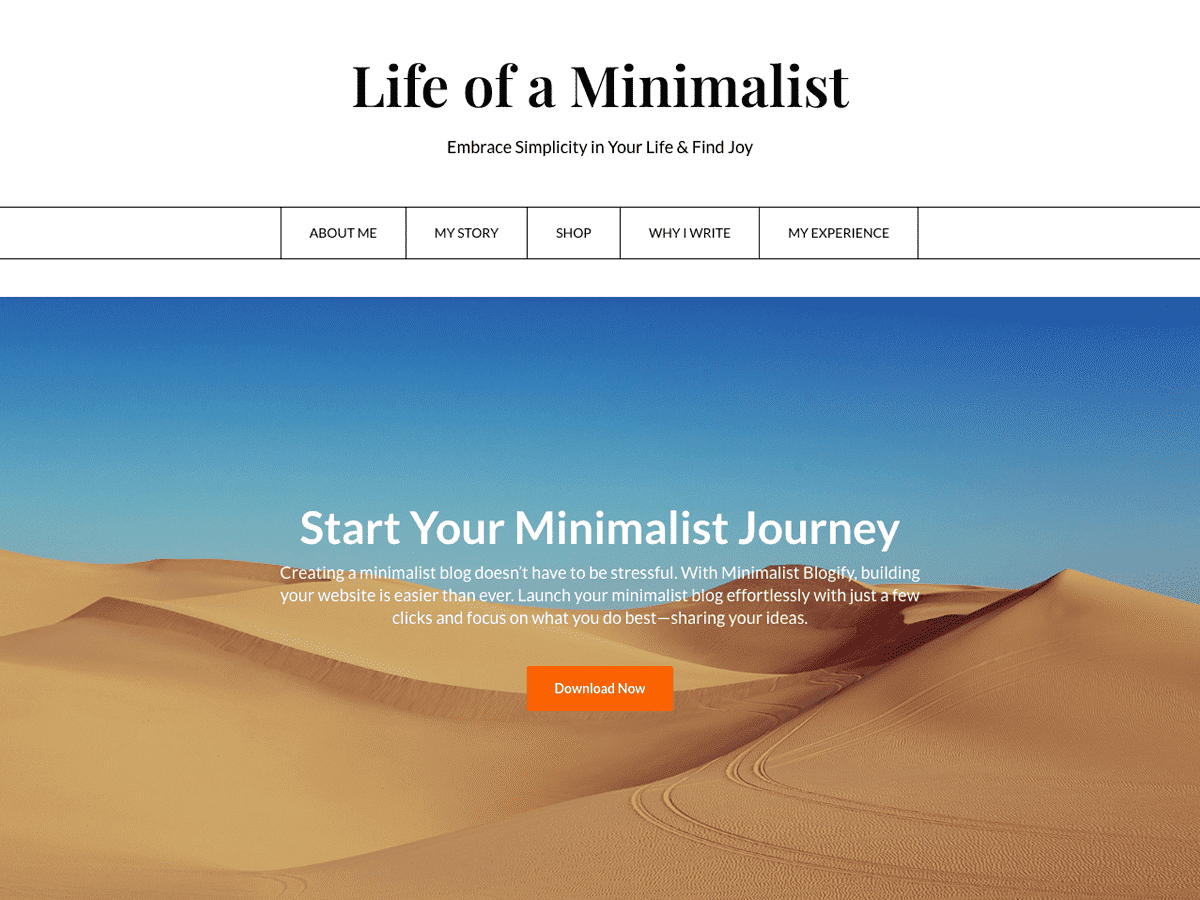In today’s digital landscape, selecting the right blogging platform is crucial. Blogify and WordPress are two popular choices, each offering unique features.
Choosing between Blogify and WordPress can be challenging. Both platforms provide robust tools for blog creation and management. Blogify leverages advanced AI to automate content repurposing and monetization, while WordPress is renowned for its flexibility and extensive plugin ecosystem. Comparing these platforms helps users understand which best suits their needs, whether they prioritize automation, customization, or integration. Let’s delve deeper into what each platform offers to help you make an informed decision. Discover Blogify here: Blogify

Credit: wordpress.org
Introduction To Blogify And WordPress
Blogging has become an essential tool for sharing information, ideas, and building an online presence. Two popular platforms, Blogify and WordPress, offer unique features to help you create and manage your blog. Let’s dive into an overview of these platforms to understand their capabilities better.
Overview Of Blogify
Blogify is an advanced AI-powered tool designed to automate blog creation, publication, and affiliate monetization. It repurposes content from over 40 sources into blogs in more than 150 languages and publishes them on various platforms.
| Features | Description |
|---|---|
| Create |
|
| Publish |
|
| Monetize |
|
| Integration |
|
- Increase online presence by repurposing content.
- Simplify the blog creation process with automation.
- Enhance SEO and monetization effortlessly.
- Manage and track affiliate earnings efficiently.
Overview Of WordPress
WordPress is a versatile content management system (CMS) that powers millions of websites and blogs. It offers a user-friendly interface, extensive customization options, and a vast library of plugins and themes.
Key Features:
- Easy installation and setup process.
- Thousands of free and premium themes for design customization.
- Extensive plugin library for adding functionality.
- Built-in SEO tools and plugins for optimization.
- Support for multiple users and roles.
- Regular updates and a large community for support.
Benefits:
- Highly customizable to fit any type of website.
- Large community provides extensive support and resources.
- Wide range of plugins enhances functionality.
- Strong SEO capabilities to improve search engine ranking.
Key Features Comparison
When choosing a platform for your blog, understanding the key features is crucial. This section compares Blogify and WordPress based on several important aspects.
Ease Of Use And User Interface
Blogify offers a user-friendly interface designed for simplicity. The dashboard is intuitive, making it easy to create, manage, and publish content. The automation features streamline the entire process.
WordPress is known for its flexibility but can be overwhelming for beginners. It has a steeper learning curve due to its extensive options and customization settings.
Customization And Flexibility
With Blogify, users can automatically create and repurpose content from over 50 sources. The platform supports AI-generated images, tables, and charts, and allows for SEO keyword-based optimization. Users can publish on various platforms and manage DNS for personal domains.
WordPress excels in customization. It offers thousands of themes and plugins. Users can tweak their websites extensively, but it requires some technical knowledge.
Seo Capabilities
Blogify focuses on SEO with keyword-based optimization. The AI helps in enhancing the content’s visibility on search engines. Automatic placement of affiliate links further boosts monetization efforts.
WordPress also offers strong SEO capabilities with plugins like Yoast SEO. These plugins provide advanced options for optimizing content for search engines.
Integration With Third-party Tools
Blogify integrates directly with popular blogging platforms and supports over 6000+ apps through Zapier. Users can connect their YouTube channels to generate blogs from videos.
WordPress supports a wide range of integrations through plugins. Users can connect to various third-party tools, but this often involves additional setup and configuration.
Content Management And Publishing
With Blogify, users can copy, download, and schedule blog posts. The platform supports social media sharing and offers direct publishing on websites like WordPress and Medium.
WordPress provides robust content management capabilities. Users can schedule posts, manage multiple contributors, and use various plugins to enhance their publishing workflow.
In summary, both platforms offer unique features. The choice depends on your specific needs and comfort with technology.
Pricing And Affordability
Choosing the right blogging platform involves considering the cost. Let’s compare the pricing and affordability of Blogify and WordPress.
Blogify Pricing Plans
Blogify offers a range of pricing plans to suit different needs. Each plan comes with a specific number of credits:
| Plan | Monthly Price | Credits |
|---|---|---|
| Lite | $3.99 | 50 |
| Basic | $15.99 | 150 |
| Premium | $31.99 | 300 |
| Business | $39.99 | 500 |
| Enterprise | $79.99 | 1000 |
For those seeking unlimited access, Blogify also offers:
- Monthly: $99.99
- Annually: $999.95
- Lifetime: $1999.99
All plans include a 3-day free trial, allowing you to explore the features before committing.
WordPress Pricing Plans
WordPress has diverse pricing plans catering to various user levels. Here are the main plans:
| Plan | Monthly Price | Features |
|---|---|---|
| Free | $0 | Basic features, WordPress.com subdomain |
| Personal | $4 | Custom domain, no ads |
| Premium | $8 | Advanced design tools, ad monetization |
| Business | $25 | Custom plugins, Google Analytics integration |
| Ecommerce | $45 | Online store features, premium integrations |
WordPress also offers a free plan, making it accessible to everyone. The paid plans unlock more features and customization options.
Value For Money
Both Blogify and WordPress provide value for money, but their focuses differ. Blogify excels in automating blog creation, publication, and monetization. This is ideal for users who want a comprehensive, automated solution.
WordPress, on the other hand, offers flexibility and customization options. It’s suitable for users who prefer more control over their blog’s design and functionality.
Evaluate your needs and budget to choose the platform that offers the best value for you.

Credit: instawp.com
Pros And Cons Based On Real-world Usage
Choosing the right platform for your blog is crucial. Both Blogify and WordPress offer distinct features and benefits. Here’s a closer look at their pros and cons based on real-world usage.
Pros Of Blogify
- Automation: Blogify automates blog creation, publication, and affiliate monetization, saving time and effort.
- Multilingual Support: Supports 150+ languages, making it ideal for global audiences.
- SEO Optimization: Automatically optimizes content for SEO, enhancing visibility.
- Content Repurposing: Repurposes content from over 50 sources, providing a wealth of material.
- AI Integration: Uses AI to generate images, tables, and charts, enriching blog posts.
- Platform Integration: Directly integrates with popular platforms like WordPress, Medium, and more.
- Affiliate Monetization: Automates affiliate link placement and provides real-time analytics.
- Cost-Effective: Offers affordable pricing plans starting at $3.99/month.
Cons Of Blogify
- Learning Curve: May require time to understand all features and integrations.
- Limited Customization: Customization options might be limited compared to traditional platforms.
- Dependency on AI: Heavy reliance on AI might not suit all content creators.
Pros Of WordPress
- Flexibility: Highly customizable with thousands of themes and plugins.
- Community Support: Large user community and extensive documentation.
- Ownership: Full control over your website and its content.
- Scalability: Scales from simple blogs to complex websites.
- SEO-Friendly: Built-in SEO features and plugins to enhance search engine ranking.
- Cost-Free: Basic version is free to use, with optional paid features.
Cons Of WordPress
- Technical Knowledge: Requires some technical skills to set up and manage.
- Maintenance: Regular updates and maintenance are necessary.
- Security Risks: Vulnerable to security threats if not properly managed.
- Costly Add-Ons: Premium themes and plugins can be expensive.
| Feature | Blogify | WordPress |
|---|---|---|
| Automation | Yes | No |
| Multilingual Support | Yes (150+ languages) | Limited (Requires plugins) |
| SEO Optimization | Automatic | Requires plugins |
| Affiliate Monetization | Automatic | Manual setup |
| Customization | Limited | Extensive |
| Pricing | Starts at $3.99/month | Free (With optional paid features) |
Ideal Users And Scenarios
Choosing the right platform for your blog depends on your specific needs and goals. Blogify and WordPress both offer unique features, catering to different types of users and scenarios. This section will help you determine which platform suits you best.
Who Should Use Blogify?
Blogify is ideal for users who want to automate the blog creation process. It’s perfect for those who need content in multiple languages and want to repurpose content from various sources.
- Content Marketers: Automate content creation and focus on strategy.
- Affiliate Marketers: Easily manage and monetize blogs with AI-powered affiliate links.
- Small Business Owners: Enhance online presence without investing much time.
- Multilingual Bloggers: Create content in over 150 languages effortlessly.
Who Should Use WordPress?
WordPress is suitable for users who prefer customization and control over their blog. It’s ideal for those who want to create a unique website with extensive plugin support.
- Developers: Enjoy full control with custom themes and plugins.
- Large Organizations: Utilize extensive features and scalability options.
- Professional Bloggers: Build a brand with advanced SEO tools and customization.
- E-commerce Businesses: Integrate e-commerce solutions and manage products.
Best Scenarios For Each Platform
| Scenario | Best Platform |
|---|---|
| Automating Content Creation | Blogify |
| Creating Multilingual Blogs | Blogify |
| Customizing Website Design | WordPress |
| Running an E-commerce Store | WordPress |
Both platforms have their strengths. Blogify shines in automating and monetizing content, while WordPress excels in customization and scalability. Choose the one that aligns with your specific needs and goals.

Credit: superbthemes.com
Frequently Asked Questions
Is It Better To Use WordPress Or Blogger?
WordPress offers more customization and flexibility. Blogger is simpler and easier for beginners. Choose based on your needs.
Is WordPress Still The Best Blogging Platform?
Yes, WordPress remains a top choice for bloggers. It offers flexibility, ease of use, and a vast plugin library.
What Is Blogify Ai?
Blogify AI is a tool that uses artificial intelligence to generate, optimize, and enhance blog content. It helps create engaging, SEO-friendly articles quickly.
How Do I Make My WordPress Site Not A Blog?
Change your homepage to a static page in WordPress settings. Designate a different page for your posts. Save changes.
Conclusion
Choosing between Blogify and WordPress depends on your needs. WordPress offers flexibility and customization. Blogify excels in automation and monetization. Blogify simplifies blog creation, repurposing content from multiple sources. WordPress provides robust support for plugins and themes. Both platforms have strengths. Blogify is ideal for automated, multilingual content creation. WordPress suits those seeking extensive customization. Consider your goals and choose the best fit. Learn more about Blogify here.

